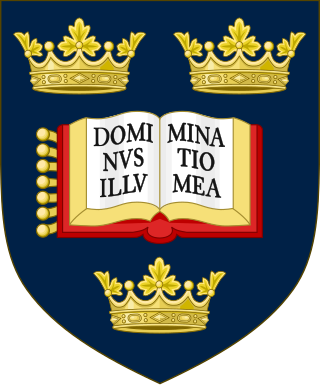
The University of Oxford is a collegiate research university in Oxford, England. There is evidence of teaching as early as 1096, making it the oldest university in the English-speaking world and the world's second-oldest university in continuous operation. It grew rapidly from 1167, when Henry II banned English students from attending the University of Paris. After disputes between students and Oxford townsfolk in 1209, some academics fled north-east to Cambridge where they established what became the University of Cambridge. The two English ancient universities share many common features and are jointly referred to as Oxbridge.

The Bodleian Library is the main research library of the University of Oxford, and is one of the oldest libraries in Europe. It derives its name from its founder, Sir Thomas Bodley. With over 13 million printed items, it is the second-largest library in Britain after the British Library. Under the Legal Deposit Libraries Act 2003, it is one of six legal deposit libraries for works published in the United Kingdom, and under Irish law it is entitled to request a copy of each book published in the Republic of Ireland. Known to Oxford scholars as "Bodley" or "the Bod", it operates principally as a reference library and, in general, documents may not be removed from the reading rooms.

All Souls College is a constituent college of the University of Oxford in England. Unique to All Souls, all of its members automatically become fellows. It has no student members, but each year, recent graduates at Oxford are eligible to apply for a small number of examination fellowships through a competitive examination and, for those shortlisted after the examinations, an interview.
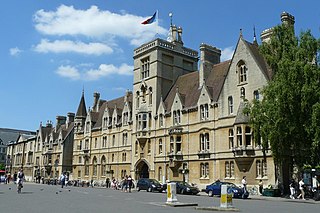
Balliol College is a constituent college of the University of Oxford. Founded in 1263 by John I de Balliol, it has a claim to be the oldest college in Oxford and the English-speaking world.

Nuffield College is one of the constituent colleges of the University of Oxford in England. It is a graduate college specialising in the social sciences, particularly economics, politics and sociology. Nuffield is one of Oxford's newer colleges, having been founded in 1937, as well as one of the smallest, with only around 90 students and 60 academic fellows. It was also the first Oxford college to accept both men and women, having been coeducational since foundation, as well as being the first college exclusively for graduate students in either Oxford or Cambridge.

Pembroke College, a constituent college of the University of Oxford, is located on Pembroke Square, Oxford. The college was founded in 1624 by King James I of England and VI of Scotland, using in part the endowment of merchant Thomas Tesdale, and was named after William Herbert, 3rd Earl of Pembroke, Lord Chamberlain and then-Chancellor of the University.
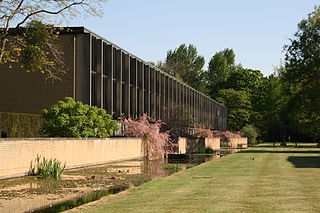
St Catherine's College is one of the constituent colleges of the University of Oxford. In 1974, it was also one of the first men's colleges to admit women. It has 528 undergraduate students, 385 graduate students and 37 visiting students as of December 2020, making it one of the largest colleges in either Oxford or Cambridge.
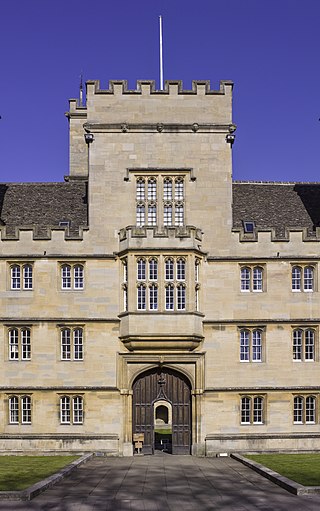
Wadham College is one of the constituent colleges of the University of Oxford in the United Kingdom. It is located in the centre of Oxford, at the intersection of Broad Street and Parks Road. Wadham College was founded in 1610 by Dorothy Wadham, according to the will of her late husband Nicholas Wadham, a member of an ancient Devon and Somerset family.
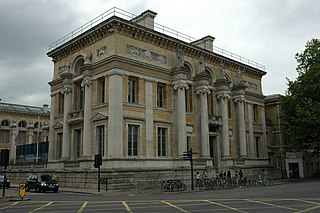
The Taylor Institution is the Oxford University library dedicated to the study of the languages of Europe. Its building also includes lecture rooms used by the Faculty of Medieval and Modern Languages, University of Oxford. Since 1889, an Annual Lecture on a subject of Foreign Literature has been given at the Taylorian Institution.

James Christopher Belich is a New Zealand historian, known for his work on the New Zealand Wars and on New Zealand history more generally. One of his major works on the 19th-century clash between Māori and Pākehā, the revisionist study The New Zealand Wars (1986), was also published in an American edition and adapted into a television series and DVD.

The Faculty of Asian and Middle Eastern Studies, is a subdivision of the University of Oxford.

The Mathematical Institute is the mathematics department at the University of Oxford in England. It is one of the nine departments of the university's Mathematical, Physical and Life Sciences Division. The institute includes both pure and applied mathematics and is one of the largest mathematics departments in the United Kingdom with about 200 academic staff. It was ranked as the top mathematics department in the UK in the 2021 Research Excellence Framework. Research at the Mathematical Institute covers all branches of mathematical sciences ranging from, for example, algebra, number theory, and geometry to the application of mathematics to a wide range of fields including industry, finance, networks, and the brain. It has more than 850 undergraduates and 550 doctoral or masters students. The institute inhabits a purpose-built building between Somerville College and Green Templeton College on Woodstock Road, next to the Faculty of Philosophy.

Christopher John Wickham is a British historian and academic. From 2005 to 2016, he was the Chichele Professor of Medieval History at the University of Oxford and Fellow of All Souls College, Oxford; he is now emeritus professor. He had previously taught at the University of Birmingham from 1977, rising to be Professor of Early Medieval History from 1997 to 2005.
The Faculty of Philosophy, University of Oxford was founded in 2001. It is part of Oxford's Humanities Division. The faculty is located next to Somerville College on Woodstock Road. As of 2021, it is ranked 1st in the UK and 2nd in the English-speaking world by the Philosophical Gourmet Report, as well as 4th in the world by the QS World University Rankings. It is additionally ranked first in the UK by the Complete University Guide, the Guardian, the Times, and the Independent.
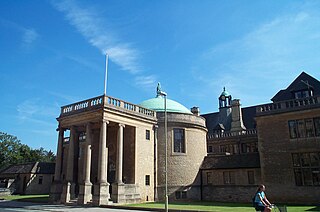
Rhodes House is a building part of the University of Oxford in England. It is located on South Parks Road in central Oxford, and was built in memory of Cecil Rhodes, an alumnus of the university and a major benefactor. It is listed Grade II* on the National Heritage List for England.
The Faculty of Medieval and Modern Languages is a department of the University of Oxford, England. It is part of the university's Humanities Division.

The Faculty of Classics, previously the Faculty of Literae Humaniores, is a subdivision of the University of Oxford concerned with the teaching and research of classics. The teaching of classics at Oxford was present since its conception and was at the centre of nearly all its undergraduates' education well into the twentieth century.

The University of OxfordFaculty of Law is the law school of the University of Oxford. It has a history of over 800 years in the teaching and learning of law.
The various academic faculties, departments, and institutes of the University of Oxford are organised into four divisions, each with its own Head and elected board. They are the Humanities Division; the Social Sciences Division; the Mathematical, Physical and Life Sciences Division; and the Medical Sciences Division.

















